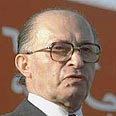
Begin. Managed to do the impossible
Photo: Yaakov Saar, GPO
Those who were in Israel
on May 17th, 1977 will always remember that night. It was one of those rare events where the question "where were you on …" is asked. In this case it is: "Where were you on the night Menachem Begin came to power? - May 17th, 1977, this week 30 years ago.
For those who were not in Israel in 1977 it's difficult to imagine what transpired here: Menachem Begin, old and ailing, after eight consistent election failures, managed to do the impossible. He made it to the premiership. Until then the Mapai party, the Labor movement that is, was so dominant that it seemed it could never be defeated.
The atmosphere of victory was so hallucinatory that on that same evening hundreds of impassioned supporters arrived at Likud headquarters in Tel Aviv crying out "Begin for prime minister." It was Ezer Weizman who went out to them and shouted: "Enough, enough, Begin is in power."
It's difficult to believe, but in the 59 years since the establishment of the State, power has been divided almost equally between Labor (in all its forms) and the Likud party. The two large parties held power half of the time. There is great temptation to make comparisons: Labor against Likud, which served Israel better?
Such a comparison is essentially unfounded: Labor was in power during the state's establishment - from the time of its inception - and it is the party that built the country, for better or for worse. During the first 30 years, alongside three large-scale wars, a state unlike many even in today's world was established here. Obviously many mistakes were made, which were unavoidable in the new circumstances that presented themselves.
One important decision
It may be said that on May 17th 1977 Menachem Begin had it made. David Ben Gurion, Moshe Sharett, Levi Eshkol, Golda Meir and Yitzhak Rabin had founded the military, the economy and society – and they all shuddered in fear that night when news anchor Haim Yavin announced: "Mahapach!" (complete change.) Primarily they feared "crazy" political and militaristic adventurism on the part of Begin - a man who since the establishment of the state had not managed anything except for a secretary and a driver. How would he suddenly rule a country?
Yet the public as a whole, including the Labor and Likud parties, didn't know whether something good or bad - depending on the eyes of the beholder – was happening to the person who entered the prime minister's office in Jerusalem. Begin almost immediately discovered that there was no connection between his impassioned speeches to the masses in Kiryat Gat and what awaited him at the Prime Minister's Office.
What happened to Begin also happened to Yitzhak Rabin during his second term in office later on, to Ariel Sharon and to Ehud Olmert in recent years, and prior to them to Shimon Peres, Benjamin Netanyahu, Ehud Barak and to a certain degree even to Yitzhak Shamir. They shifted their political views and objectives from one extreme to another. Apparently, in the office, behind the walls, reality hits the idealistic visions of prime ministers in the face.
It is said that one important decision is enough for a prime minister to enter the annals of history. Menachem Begin made two: The peace agreement with Egypt and the bombing of the Iraqi nuclear plant. A third decision, the massive expansion of the settlement enterprise, is embroiled in controversy, and its damage may equal the benefits of the two former decisions. In all other parameters, including the rise of corruption, the Likud party has no reason to break out in dance.
Either way, this week marks the 30th anniversary of Likud's rise to power. And who are we to spoil the fun.















